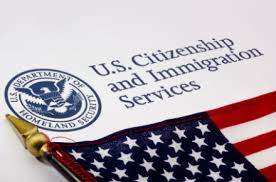POSTING DATE: June 4, 2018
Learn More About:
Immigration News & Updates eNewsletter © 2011 - 2018
For questions about U.S. Residency, Green Cards and Immigration Visas, Visit our Website at: www.ImmigrateToday.com or call our office at: (954) 382-5378
Check Out This Cool Stuff For Immigrants....
Immigration
Questions & Answers
This Week's Immigration News
Question: I am filling out the form for citizenship and I got stuck when it asks for my trips over the last 5 years. I have an elderly mom in Jamaica and I work for a shipping company, so I can go visit her whenever I please, which is a lot. At least a few days every few weeks. The trouble is that when I look at my passport, its really a big mess and I cannot make out which trip is on which date. There are even entry stamps that are on top of each other. What would happen if I got the dates wrong? I will do my best but will it matter if some of the dates are not exact?
Answer: As is often the case, U.S. and foreign border officers alike, simply stamp your page without even considering whether it is legible or not. In most naturalization cases, making the best guess you can for illegible dates is the best you can do and the USCIS will not fault you for it. However, fortunately, the U.S. Customs and Border Protection (CBP) agency has a website which allows travelers to access their U.S. travel history going back five years from the request date. To access the information, go to the CBP website and click on “Get Travel History” and print out the report.
Hidden Advantages Of Long Processing Times
In Marriage Immigration Cases
Helpful Immigration Tips You Can Use...
Immigration News & Updates eNewsletter
eNewsletter
Yes, excessive USCIS processing times in Residency cases can be frustrating, annoying and seem very inconvenient. However, there are some hidden benefits which make suffering through the long process worth the wait. To understand the benefits, let’s look at an overview of the steps involved in the marriage immigration process inside the U.S..
Once a couple marries, they file an immigration package with the USCIS National Benefits Center to obtain residency for the foreign spouse.
USCIS Not Required To Apply 90 Day Misrepresentation Rule
In September 2017, the State Department abruptly changed its policy with regard to the so called “30/60 Day Rule” to increase it to 90 days, for immigration actions taken by non-immigrants in the U.S. within a certain time of arriving in the U.S.. The old “30/60 Day Rule”, held that if a foreign national files a change of status or Residency application within 30 days of entering the U.S., there is a presumption of so called “preconceived intent” that the person misrepresented his or her intentions when they entered the U.S. on their tourist visa. However if the application was made more than 30 days but less than 60 days after entering the U.S., it would not necessary be presumed that misrepresentation existed, unless other facts arose to show “preconceived intent” at the time of entry. Finally, applications made after 60 days were presumed to be free from any “preconceived intent” at all.
In 2017, the USCIS changed its policy regarding the use of language Interpreters during Immigration interviews for Immigrants wishing to bring interpreters to interviews to provide language assistance. Under the new guidelines, Interpreters are required to sign a Declaration stating that they will accurately, literally and fully interpret for both the interviewee and the interviewing officer. Interpreters must be age 18 or over, cannot be the attorney, accredited representatives of the interviewee or a witness. Family members are not automatically disqualified, however, it is up to the USCIS Officer as to whether or not the family member qualifies.
New U.S. Citizens – Make Sure You Register
To Vote Before the Deadline!
This year’s election in November is pivotal for immigrants and our nation as a whole. It is not a Presidential election, but just as important, as its outcome will have far reaching effects on immigrants and Americans alike, in all areas of our lives, for many years to come.
So remember, that after all the procedures you had to go through to become a new U.S. Citizen, your process is not complete until you register to vote!
Immigration How To:
How Do I Know If I Can Have An Interpreter At My Immigration Interview?
If the case is filed properly, the USCIS issues the Work/Travel permits in about 90 days, which are valid for one year. The next step is waiting to be scheduled for the marriage interview, which in past years, was commonly within 6 months or so. These days, in some regions, including Florida, it can take up to two years or more for the marriage interview to be scheduled, requiring that both the Work/Travel permits be renewed. Once the couple attends the marriage interview, if all goes well, the USCIS sends the Green Card via Priority Mail within about 2 weeks.
Now comes the technical part. Immigration law provides that if the couple is married LESS than 2 years by the date of the marriage residency interview, the foreign spouse only receives 2 year CONDITIONAL residency (with the only exception of spouses of Cuban nationals who automatically receive permanent residency). This requires that the couple remain living together in a real marital relationship and a second case called “I-751 Petition to Remove Conditions on Residence” be filed in 1 year and 9 months to make the foreign spouse’s residency permanent. Currently, the I-751 petition processing time can be 1 year and in many cases more. Then, once petition is approved and the foreign spouse receives PERMANENT residency, an early Naturalization application can be filed by the foreign spouse, as long as the following conditions are met: the couple has been married for at least 3 years and continues living together in a real marriage, the U.S. spouse has been a U.S. Citizen for at least 3 years, and the foreign spouse has held U.S. residency status (including conditional status) for at least 2 years and 9 months. Often, due to the long delays in USCIS approval of the foreign spouse’s permanent residency, filing for early naturalization can be delayed for many months, especially if the USCIS determines that the couple must attend a second interview, which happens when a couple fails to submit sufficient marital documentation with the I-751 application.
Current very lengthy USCIS processing times at many south Florida USCIS offices has begun to result in many residency cases being scheduled for interviews after the couple has been married for 2 years or more. This is particularly true for couples who married, but did not immediately file the residency case and also for those in which the case was delayed by the submission of inadequate documentation, necessitating the USCIS request for more documents, which can delay a case by up to 6 months or more. As a result, more and more foreign spouses have begun to receive permanent 10 year residency (Green Cards), which exempts them from having to file the I-751 Petition to Remove Conditions on Residence, and the excessive delays inherent in the additional process. Further, by avoiding the delays often caused by having to file the I-751 petition, as long as the foreign spouse meets the requirements, he or she can immediately file for early naturalization, once they have held residency status for 2 years and 9 months.
It has been expected that the USCIS would adopt the new more restrictive measure and apply the 90 day rule to all immigration applications made by individuals in the U.S. after September 2017. As a result, applicants were advised to be safe and to wait for 90 days from the date of entering into the U.S. before filing any applications with the USCIS or before taking any steps like getting married to a U.S. Citizen.
However, when the USCIS updated its Policy Manual recently, it specifically indicated that the State Department 90-day rule “is not binding on USCIS.” Rather, the Policy Manual says that USCIS Officers “should continue to evaluate cases for potential fraud indicators and, when appropriate, refer cases to Fraud Detection and National Security according to existing procedures.” As a result, it seems likely that the “30/60 Day Rule” continues to be the prevailing policy used by USCIS adjudications officers when reviewing cases. Thus, as long as non-immigrant applications are filed after 60 days of entry and immigrant cases are filed after 30 days, “preconceived intent” should not be an issue.
The application includes the I-130 spousal petition, Affidavit of Support and the foreign spouse’s I-485 adjustment of status application, I-765 request for work authorization and I-131 request for permission to travel, along with extensive supporting documentation required for the case.
Question: I have a question for you. I am married to an American and got my citizenship a few years ago. I filed for my mom and my step dad in 2016 and they are living in the USA now with their green cards. I had not heard from my biological dad for all these years cause he never married my mom and had another family. But recently we got in contact and over the past year we got to know each other and he wants me to file his immigration papers as my dad. I don’t mind doing it, but I don’t want to do anything that would affect my step dads residency, cause he is like my real dad, the only one I known for all these years. So, can I still file for my biological dad in Jamaica, or I can’t because I can only file for one mom or dad? Thank you.
Answer: Very important question. U.S. Citizens can sponsor their parents in a special category called “immediate relatives”. This includes biological and step parents. Step-parents are considered to qualify as “parents” for immigration purposes, as long as the U.S. Citizen’s biological parent married the step-parent, before the child reached the age of 18. A U.S. Citizen can sponsor both a biological parent and step-parent, meaning a biological mother & father and qualifying step-mother and step-father, so, four parents.
The issue then comes into play about the relationship between the child’s parents. In a simple scenario, a U.S. Citizen’s biological mother is married to his or her biological father, and the same for step-parents, so both parents qualify. It gets more complicated, however, when a biological father was not married to the U.S. Citizen child’s biological mother. When a child’s parents were not married before the child reached age 18, the child is considered to be “born out of wedlock”. In order for the U.S. Citizen child to then sponsor his or her father, U.S. immigration regulations require not only a showing that the father is the biological father, but further that the father showed responsibility, care and concern for his child before the child turned age 18. Evidence would include proof of living with the child during that time, or payment of regular child support, holding the child out as his child, etc. Proving care and concern is particularly difficult in countries which do not normally formalize child custody and support through the courts, so child support is paid sporadically and in cash or by the purchase of clothes and other necessities for a child, including the payment of school fees and other expenses. It can be done, but it takes extensive documentation and is always an uphill battle with the USCIS.
So in the case of your biological father, who it appears did not have a father-child relationship with you when you were young, it would likely be impossible for you to meet the evidentiary requirements under U.S. law. Immigration regulations are not designed to provide immigration benefits to a father who is not able to show that he met his parental responsibilities, even if he is in fact the child’s biological father. So in your case, unfortunately, you won’t be able to sponsor your father in Jamaica to immigrate to the U.S.. I hope this is helpful to you.
You can get more free information about sponsoring a father who was not married
to your mother, by calling our office at: 954-382-5378.
Most states have voter registration deadlines. In Florida, a Citizen must register to vote at least 29 days before an election. This year’s General Election is Tuesday, November 6, 2018, so the deadline to register is October 9, 2018. The Primary Election when the candidates from both parties are chosen is August 28, 2018, so the final registration date is July 30, 2018.
In order to register to vote in Florida, you must be a U.S. Citizen at least 18 years of age, residing in Florida and must provide your current, valid Florida driver’s license or identification number or your Social Security Number. It’s worth noting that non-citizens who register to vote, risk being denied U.S. Citizenship. Occasionally, an Immigrant is mistakenly put on the voter registration list or mistakenly registers as part of the Driver’s License or other governmental application process. The Immigrant usually finds out that he or she is showing up in the voter registration records when they receive a notice to serve on “Jury Duty”, which is reserved only for Citizens. In such cases, Immigrants should immediately notify the voter registration office to remove them from the rolls and get some written notice confirming the removal. Otherwise, if a U.S. Resident’s name shows up on the voter registration rolls during the naturalization process, not only can Citizenship be denied, but the Resident may also risk losing their residency status as well.
If the officer determines that an interpreter does not meet the standards, he or she can have them disqualified and the Immigrant will then need to choose to
1) continue the interview using a qualified interpreter;
2) reschedule the interview per local procedures so that the applicant may bring a qualified interpreter; or
3) continue the interview without an interpreter, if the applicant and officer can communicate effectively in English.
Government Releases Average Processing Times
Report for All USCIS Offices
The USCIS recently released national average processing times for common immigration cases. The government fiscal year runs from October 1st through September 30th of every year.
It’s no secret for those of us in the field, that USCIS processing times for many types of cases have dramatically increased over the past year, with cases becoming more and more backlogged every month that goes by.
Here are some common immigration case types with increased average processing times over the previous fiscal year, up to January 31, 2018:
I-90, Application to Replace Permanent Resident Card, processing time for Green Card replacements and renewals increased from 6.1 months in 2017, to 9.2 in 2018, I-130 family Petitions for Alien Relatives increased from 6 months in 2017 to 9.4 months in 2018,
I-485 Application to Register Permanent Residence or to Adjust Status increased from 6.8 months in 2017 to 10.5 months in 2018,
I-751 Petition to Remove the Conditions on Residence filed by spouses of U.S. Citizens, increased from 9.1 months in 2017 to 14.9 months in 2018,
I-765 Application for Employment Authorization increased from 2.6 months in 2017 to 4.3 months in 2018,
N-400 Application for Naturalization processing times increased from 5.6 months in 2017 to 9.5 months in 2018.
In many offices throughout the country, including south Florida, processing times are even longer, for instance over one year in some cases for Naturalization cases, and nearly two years for Adjustment of Status to Residency.
Read the full Historical Average Processing Time for All USCIS Offices report












